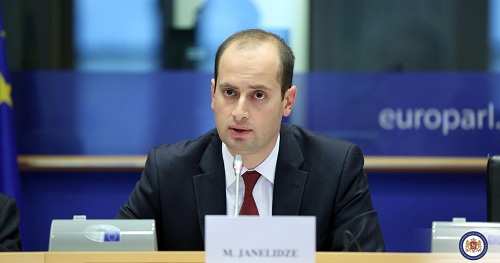| FM Janelidze: Georgia Meets EaP Summit ‘In Good Shape’ |
| Civil Georgia, Tbilisi / 20 Oct.'17 / 20:19 |

Mikheil Janelidze, October 19, 2017. Photo: MFA Georgia
Georgia is approaching the upcoming Eastern Partnership (EaP) summit “in good shape,” and is “ready to do even more than the Association Agreement requires from us, because we are doing it for our future in the European Union,” the Georgian Foreign Minister Mikheil Janelidze said at the meeting of the European Parliament Committee on Foreign Affairs (AFET) on October 19.
In his opening remarks to MEPs, Janelidze noted he was “proud to represent one of the strongest EU-enthusiast countries,” adding that “around 80 per cent of the entire population of Georgia supports the EU integration,” and that “Georgia’s democratic transformation is a product of its European aspirations.”
Janelidze highlighted Georgia’s role in enhancing Europe’s access to the Asian markets and vice versa, noting that Georgia had accelerated investment in road infrastructure, was building a deep-sea port on the Black Sea, and finalizing the Baku-Tbilisi-Kars railway project. He also said that Georgia was contributing to the energy security of the EU.
Janelidze reminded the European Parliament members that “there is ongoing occupation of Georgian regions by the Russian Federation,” which continued “to absorb the regions of Abkhazia and Tskhinvali/South Ossetia into its political, military, security and social structures through so-called integration treaties and subsequent illegal agreements.”
The Minister also highlighted Russia’s military build-up in both occupied regions, saying it posed threat “not only to Georgia, but to the whole region,” which was especially alarming because Russia “neglects the non-use of force commitment and hinders establishment of international security mechanisms on the ground as envisaged by Paragraph 5 of the ceasefire agreement of August 2008.”
Janelidze spoke about the ethnic discrimination “which has intensified in both Abkhazia and Tskhinvali regions,” pointing out the demolition of Georgian houses in the ethnically cleansed Eredvi village, east of Tskhinvali, as an example of an ongoing effort involving “complete rooting out of Georgian traces, Russification and further steps towards annexation of those regions.”
Other examples involved pressure on ethnic Georgians in Abkhazia to change their surnames and national identity into the Abkhaz ones, and denial of the right to receive education in native language to the Georgian children of Gali district in Abkhazia and Akhalgori Municipality in Tskhinvali Region. Meanwhile, said Janelidze, the refugees and IDPs that had been forced to leave their home regions of Abkhazia and Tskhinvali still were denied their fundamental right of return.
Janelidze thanked the European Parliament members for addressing the issue of Georgia’s territorial integrity, and said he was looking forward for their continued support in this regard through their “relevant resolutions and statements.”
Besides the EU Parliament members, Foreign Minister Mikheil Janelidze also met with Didier Reynders, Deputy Prime Minister and Minister of Foreign Affairs and European Affairs of Belgium. According to the Georgian MFA, Janelidze thanked his counterpart for the country’s firm support for Georgia’s European and Euro-Atlantic aspirations and the reform course. The two ministers also discussed the Belgian business delegation’s upcoming visit to Georgia, with Reynders reaffirming Belgium’s firm support for Georgia’s sovereignty and territorial integrity.
Excellent meeting between Georgian and Belgian FMs @dreynders & @JanelidzeMkh. 25 years of friendship and increasing cooperation pic.twitter.com/CONWYWgG4v
— Natalie Sabanadze (@natasabanadze) October 19, 2017
Janelidze’s visit to Brussels follows adoption by the AFET of a resolution on recommendations for the Eastern Partnership on October 10. AFET advocated trust fund for Ukraine, Georgia and Moldova, suggested “EaP+” model offering Eastern partners access to customs or energy union, and called for collective pressure on Russia in order to resolve conflicts in Eastern Ukraine, the occupied territories of Abkhazia and South Ossetia, and Transnistria.
